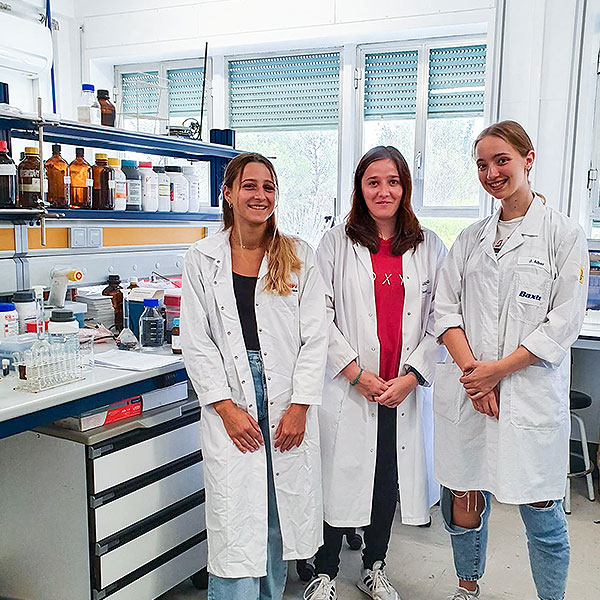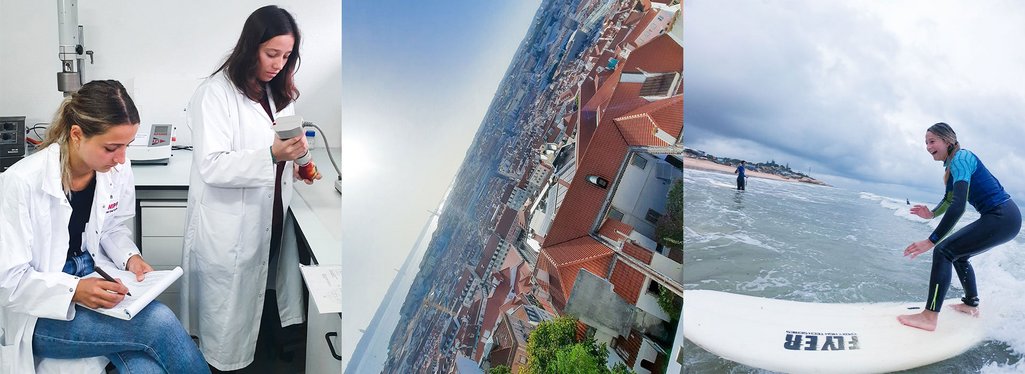
RAMPF Goes Global – An Internship Abroad In Portugal
Working where others go on vacation? This dream became reality for Alexa Gross. As part of her training as a laboratory chemist at RAMPF Polymer Solutions, she spent a month in Lisbon at the Instituto Nacional de Investigação Agrária e Veterinária (INIAV) as an Erasmus intern.
Doing an internship during training? At RAMPF, nothing is impossible!
The group of companies is not afraid to break new ground to offer its up-and-coming specialists unique experiences and best possible learning opportunities. If this means jumping aboard a plane and flying to Lisbon, Portugal – why not? This is how Alexa Gross has just become the first RAMPF trainee to do an internship abroad!
Alexa had learned about the possibility of an internship in Portugal at her vocational school. When she told her instructor Philipp Linsenmayer, Head of Laboratory Foam Gaskets at RAMPF Polymer Solutions, about this opportunity, he immediately supported her plans.
There were only three internship places available at the INIAV, a state institute in Lisbon that deals with agriculture, plant cultivation, fodder and food chemistry. However, the laboratory chemist trainee was not deterred. Encouraged by her school teacher and Philipp Linsenmayer, she sent an application – and promptly received a positive answer!
Instituto Nacional de Investigação Agrária e Veterinária, I. P. (INIAV)
The National Institute of Agricultural and Veterinary Research, I.P. (INIAV), is Portugal’s state laboratory for agriculture, forestry, and rural development, initiating research activities in the agronomic and veterinary areas.
Bye, Grafenberg. Bem-vindo a Lisboa!
Bem-vindo a Lisboa, or in English – welcome to Lisbon. When Alexa arrived in the capital of Portugal at the beginning of October last year with only very basic language skills in her luggage, it is – for German standards – still summer. During the day, the thermometer climbs to 30 °C, and the sun beats down. "Luckily, I had planned a few vacation days before the internship started," Alexa says.
Portugal has a lot to offer in terms of leisure time. The popular travel destination lures with breathtaking nature, impressive historical and cultural sights, dreamy fishing villages, bright sandy beaches, spectacular cliffs, and waves that make surfers' hearts beat faster.
Alexa and her two classmates, who were also doing an internship at the INIAV, used the weekends to travel and get to know the country and its people. Through the exchange program, the trainees had a train ticket with which they could explore the entire region around Lisbon.
Amongst others, they went to Sintra, where there are a number of castles and palaces, some of which are centuries old, and visited the colorful coastal city of Porto. The westernmost point of Europe at Cabo da Roca and excursions to some of Portugal’s famous beaches, including the most famous of them all, Nazaré, were also on their agenda.
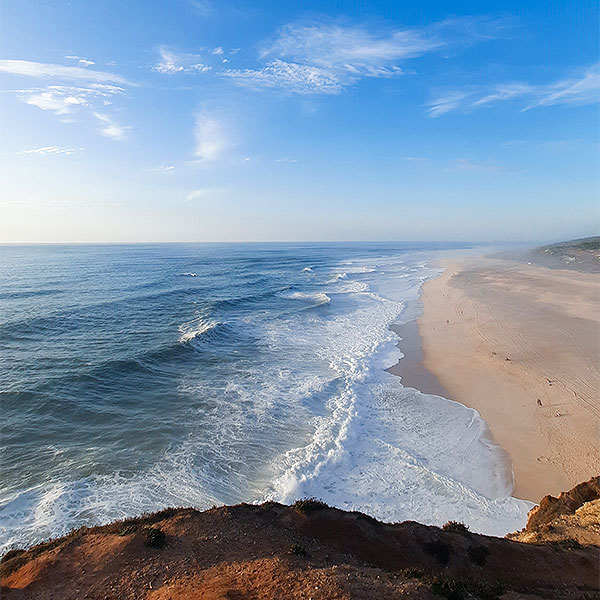
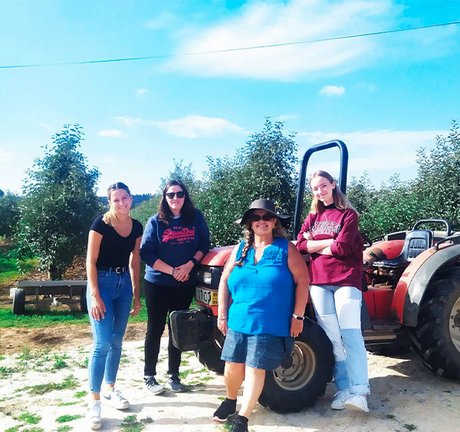
Lunchbreak at the beach
Alexa gained many new professional insights during her stay in Portugal, although the work in the laboratory was a change at first. “Working at INIAV was very different from RAMPF in many ways,” Alexa reports. The internship abroad meant not only a new language, new colleagues, a new job, and new tasks, but also a new work routine that one has to get accustomed. “Many of the employees don't come to work until around 10 or 11 a.m., and on hot days there is sometimes a longer lunch break where you can go to the beach,” she says.
It is completely different from Germany – but it does not sound that bad, does it!
With Manuela, her tutor at INIAV, Alexa and the other interns also got to know the work of the institute outside of the laboratory. Amongst others, they spent a day at the FICA trade show and went on a business trip that took the interns to a large apple farm belonging to INIAV, where they helped out and harvested apples.
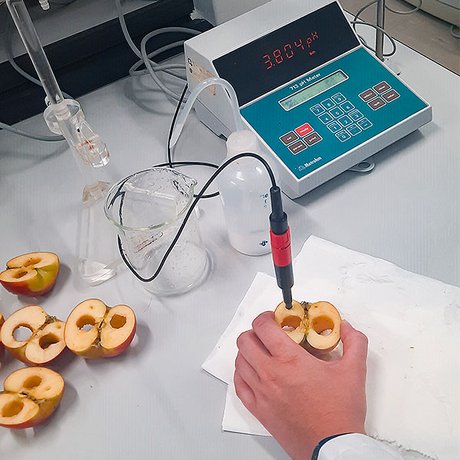
Apples, artichokes, milk and cheese
No, the list is not part of a shopping list or Alexa's favorite foods in Portugal, but describes what she was involved with in at the INIAV laboratory. One of her tasks was to analyze apples from different producers and determine parameters such as pH, acidity, and external color.
In the "Milk-Cheese-Project", as she calls it, Alexa and her colleagues studied the properties of wild artichoke flowers. The plant with the botanical name Cynara Cardunculus grows in the Portuguese Serra da Estrela and can be used to make cheese.
Anyone who has ever been to a cheese dairy knows that making cheese requires rennet. The enzymes in the rennet ensure that the milk thickens without turning sour. Animal rennet is obtained from the abomasum of calves or lambs, and the enzymes in the artichoke flowers are a plant-based alternative.
In the experimental setup, Alexa and her colleagues first crushed the flowers, stirred the powder into salt solutions with different salt contents, and then added it to the milk. Now they determined the time until the milk began to curdle and turn into cheese.
In countries like Spain and Portugal, cheese production with vegetable rennet has a long tradition. Knowledge of the milk-curdling properties of some artichoke flower species has been used for centuries to make traditional Portuguese cheeses such as Queijo Serra da Estrela and Azeitão. In Central Europe, on the other hand, this method of cheese production is largely unknown.
An enriching experience – personally and professionally
Looking back, Alexa's expectations of her time in Portugal were not only met, but exceeded:
The internship and the work at INIAV gave me a lot of impetus for my training as a laboratory chemist. I really appreciate that RAMPF gave me the opportunity to do the internship in Portugal. Without the company’s support, the dream of an internship abroad would not have come true. I’m also very grateful that RAMPF is enabling me to learn as much as possible during my apprenticeship. Amongst others, the exchange with Eurofins allows me to practice analytical methods for school. I can also practice syntheses in our laboratory, which this is not normally part of my job, but I need it for school.
With her decision to go abroad, Alexa took a risk that paid off. Not only for her, but also for RAMPF and all trainees who will follow her example to gain their own experiences abroad.
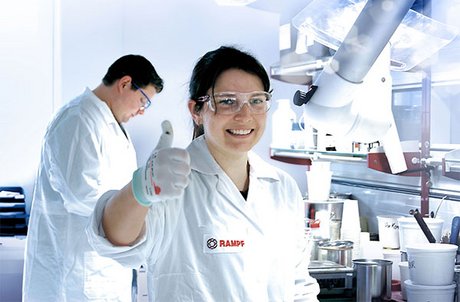
Laboratory Chemist Training at RAMPF
The tasks of chemical laboratory trainees at RAMPF encompass, amongst others
- Experiments in the lab as well as testing of qualitative and quantitative analyses
- Developing of new products tailored to the needs of customers (e.g. polyurethanes)
- Analysis of test characteristics such as reaction time, product hardness, and elasticity
- Direct collaboration with customers in product testing
Parallel to the training in the company, trainees attend the Kerschensteiner School in Stuttgart, where they expand their specialist knowledge in various areas of chemical work. These include organic chemistry, inorganic chemistry, and laboratory practices such as synthesis.
Are you interested?
Interesting articles
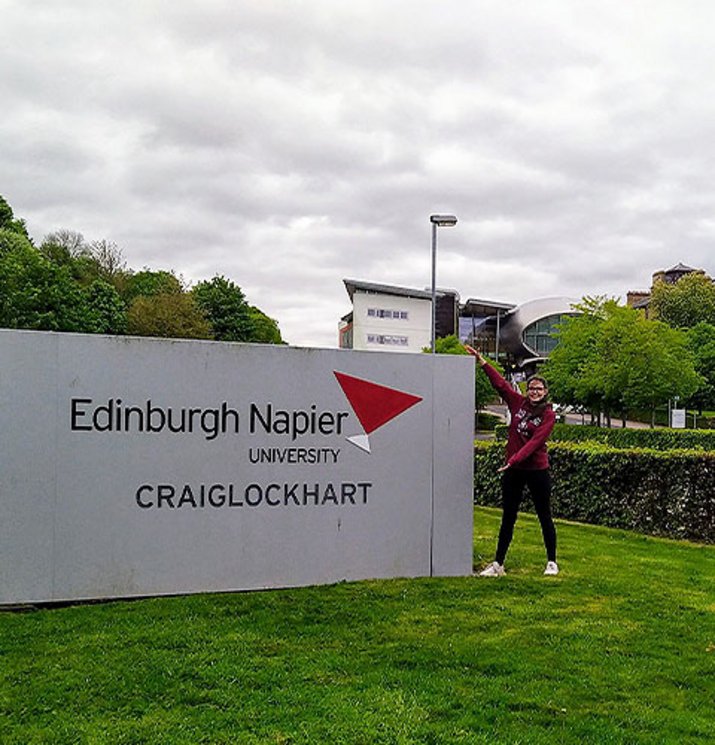
RAMPF goes international – Studying in Scotland!
Getting to know a new culture, exploring picturesque landscapes, taking informative lectures – Franziska Weiß spends the fourth semester of her dual bachelor's degree in business administration at Edinburgh Napier University. …
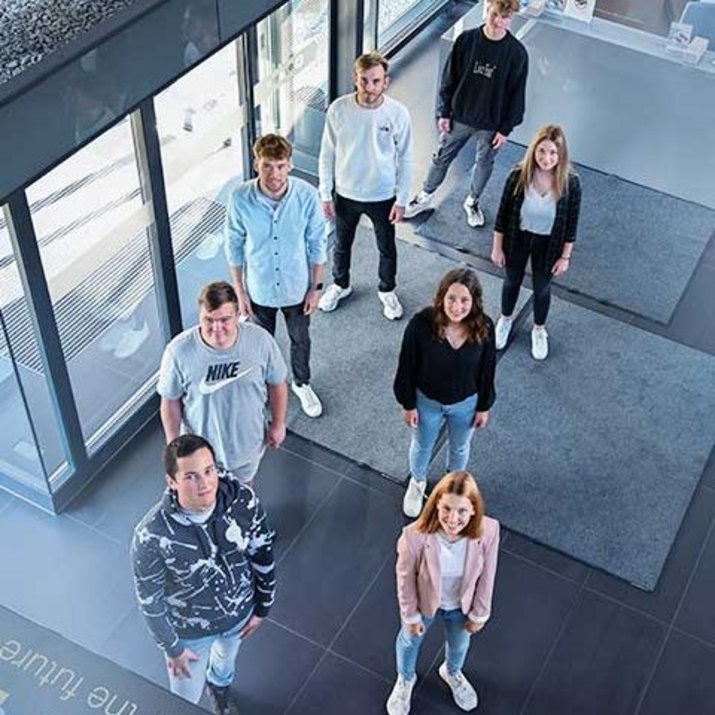
Successful Career Start
Young RAMPF talents immerse themselves in the exciting world of our international Group of companies with motivated trainers and helpful mentors accompanying them.

